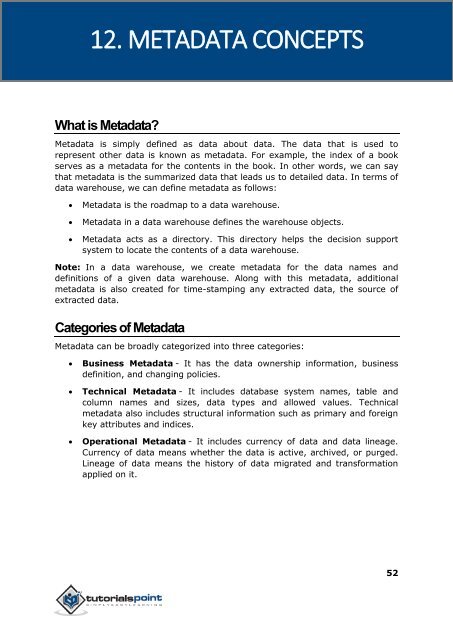dwh_tutorial
Create successful ePaper yourself
Turn your PDF publications into a flip-book with our unique Google optimized e-Paper software.
12. METADATA CONCEPTS<br />
DWH<br />
What is Metadata?<br />
Metadata is simply defined as data about data. The data that is used to<br />
represent other data is known as metadata. For example, the index of a book<br />
serves as a metadata for the contents in the book. In other words, we can say<br />
that metadata is the summarized data that leads us to detailed data. In terms of<br />
data warehouse, we can define metadata as follows:<br />
<br />
<br />
<br />
Metadata is the roadmap to a data warehouse.<br />
Metadata in a data warehouse defines the warehouse objects.<br />
Metadata acts as a directory. This directory helps the decision support<br />
system to locate the contents of a data warehouse.<br />
Note: In a data warehouse, we create metadata for the data names and<br />
definitions of a given data warehouse. Along with this metadata, additional<br />
metadata is also created for time-stamping any extracted data, the source of<br />
extracted data.<br />
Categories of Metadata<br />
Metadata can be broadly categorized into three categories:<br />
<br />
<br />
<br />
Business Metadata - It has the data ownership information, business<br />
definition, and changing policies.<br />
Technical Metadata - It includes database system names, table and<br />
column names and sizes, data types and allowed values. Technical<br />
metadata also includes structural information such as primary and foreign<br />
key attributes and indices.<br />
Operational Metadata - It includes currency of data and data lineage.<br />
Currency of data means whether the data is active, archived, or purged.<br />
Lineage of data means the history of data migrated and transformation<br />
applied on it.<br />
52


